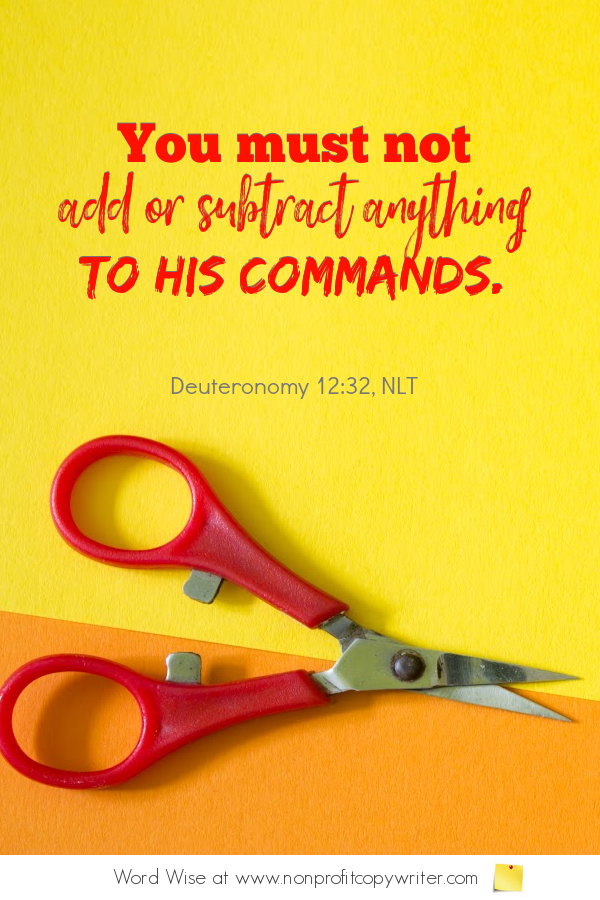Save Time: Get 5 Simple Writing Tips
you can put to use in 10 minutes
The Revision: It’s Where the Real Writing Happens
Award-winning writer Kathy Widenhouse has helped hundreds of nonprofits and writers produce successful content , with 750K+ views for her writing tutorials. She is the author of 9 books. See more of Kathy’s content here.
An online devotional for writers
A Word From The Word
So be careful to obey all the commands I give you. You must not add anything to them or subtract anything from them. (Deuteronomy 12:32, NLT)
A Word For Writers
Revision is different than editing, although writers may mistakenly use the terms interchangeably.
Revision allows you to narrow your topic focus. Often, it involves making major changes to a document’s content or structure by eliminating certain sections … completely rewriting others … adding details to make your point. An academic review board, for instance, may ask a researcher for several revisions before accepting a paper for publication.
Revision is where real writing happens.
Editing, on the other hand, involves correcting grammar, substituting different words, and rearranging one or two sentences. Typically, your work will undergo editing only after revision.
Thomas Jefferson conducted one of the most infamous revisions in history. He used a razor blade and scissors to revise the New Testament, cutting out Jesus’s miracles and resurrection and leaving only the portions that portrayed Jesus as a man of morals. “The Jefferson Bible, as it is now known, included no signs of Jesus’s divinity,” says Erin Blakemore for The History Channel. “Most Christians would hardly recognize it.”
Yet Jefferson’s revision did not bring his “project” into focus. Instead, his revision altered the work completely by removing the message of the New Testament – that Jesus is Lord.
“You must not add anything or subtract anything from (it).” So God told his people in reference to scripture (Deuteronomy 12:32).
Jefferson used a process that’s essential for your writing and mine. He simply used it on the one piece of writing in all of history that didn’t need it.
A Wise Word
Revision is where real writing happens.
A Word To Pray
Gracious Father,
Your Word is sacred, but my writing is not. Show me how to revise my work to cut out the unnecessary and add details where needed to make my point.
In Jesus’s name, Amen.
More Devotionals for Writers
The Typo: Learn from a Royal Mistake ...
The Delete Key: Make Friends with It ...
The Section Break: Give Readers A Chance to Think ...
The First Draft: Don’t Let Your Idea Get Trapped By Your Fear ...
The Edit: Know When It’s Time to Fix, Throw Away, and Keep ...
The Pencil: God Sharpens the Ones He Uses ...
The Book Editor: The Quiet Co-Worker ...
Wise Words: Devotionals for Writers ...
More Devotionals for Writers on our Pinterest board ...
Join other Christian Writers in the Writing for Ministries Community ...
Free Mini-Course: Getting Started Writing Devotionals ...
Get more devotionals for writers delivered to your inbox each week:
Return from The Revision to Nonprofit Copywriter home
As an Amazon Associate I earn from qualifying purchases.
Share This Page

Named to 2022 Writer's Digest list
BEST GENRE/NICHE WRITING WEBSITE


Stop Wasting Time!

Grab your exclusive FREE guide, "5 Simple Writing Tips You Can Put to Use in 10 Minutes or Less"











